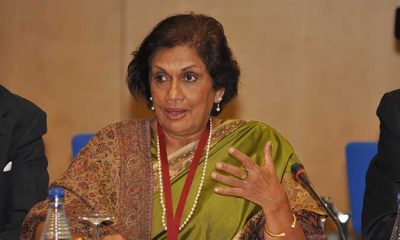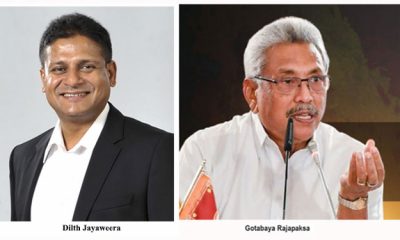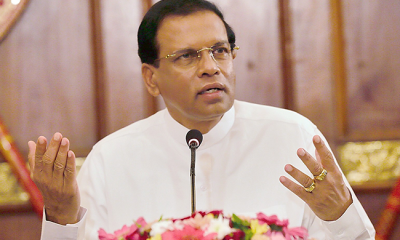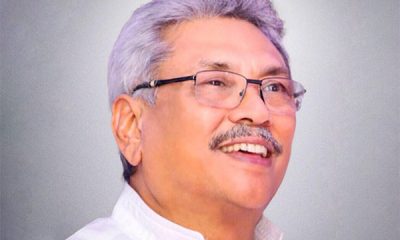Editorial
Gota’s return

There were reports on Friday morning as this is being written that former President Gotabaya Rajapaksa may be back in Sri Lanka over the weekend. No reasonable person will want to deny him his birthright of living here whatever the circumstances under which he ‘fled’ the country as has been stated ad infinitum since his departure. When he was forced to leave the country, caving into the massive ‘GotaGo’ demand, he did not find it easy to find a safe haven of refuge. It has been reported, though not confirmed, that he first explored the possibility of returning to the USA, whose citizenship he renounced, to run for president in Nov. 2019. Rajapaksa then as a dual citizen of Sri Lanka and the U.S. constrained by the then law from running for president while being a foreign citizen. Hence his renunciation of his U.S. citizenship.
When he was forced to depart, he first flew to the Maldives by military aircraft and within hours by a commercial flight to Singapore from where he resigned the presidency. The Singapore government which extended his original two week stay permit by two more weeks said on the public domain that GR was on a private visit and had not sought asylum. He had not been accorded facilities (perhaps other than security) or hospitality, an official statement from the Government of Singapore said. From the city state he flew to Thailand on a private charter and was confined to his hotel for reasons of security.
It has also been reported that he was exploring the possibility of returning to the United States where he had lived earlier following his premature retirement from the Sri Lanka Army holding the rank of lieutenant colonel. He returned to Sri Lanka following his brother’s election as president in 2005 and served as defence secretary until Mahinda Rajapaksa’s defeat in 2015, overseeing the end of the long war against the LTTE in 2009. He renounced his U.S. citizenship to run for president in 2019. Given his foreshortened tenure, he is reported to have explored the possibility of resuming U.S. residency. This, a former local employee of the U.S. Embassy in Colombo, now resident in the U.S. has said in a recent article, may not be easy for GR.
Although the former president renounced his U.S. citizenship, his wife retains her citizenship and his son and family live in that country. There may be reasons for allowing GR to return to the U.S. on grounds of family reunion. Also, as has been publicly pointed out, former presidents of Sri Lanka and their widows have several legal entitlements enjoyed by many of GR’s predecessors and their widows. He too would enjoy such entitlements. These include pensions, security, vehicles, residences and possibly staff. Mrs. Hema Premadasa, President Ranil Wickremesinghe noted in Parliament recently, is enjoying these benefits. So is former President Chandrika Kumaratunga who has accused President Mahinda Rajapaksa of attempting to, or actually doing her down. Former President Maithripala Sirisena, since his departure from office, continued to live in two government bungalows joined together as a presidential residence during his tenure but vacated those premises following a court order.
Although the actual date has not been set as this is being written, the former president is very likely be back in Sri Lanka in the short term. This has been discussed and facilitation requested by the SLPP. President Wickremesinghe, not long ago, expressed an opinion that the time was not right for Gota’s return. There is no doubt that the former president’s security, particularly, must be ensured. That is an obligation of the state. Like Presidents Jayewardene and Premadasa before him, GR chose to live in his private home at Mirihana rather than in President’s House for most of his tenure. Readers would remember that the Aragalaya gained momentum following an attack on this house, going beyond non-violent protest as was the case earlier. Although Rajapaksa as defence secretary lived in a government bungalow equipped with a giant tank in which sharks swam, he chose to continue living in his modest home as president. Once he is back, this may not be a suitable place for him to live on grounds of security considerations. His army pension too would be modest.
We do not know whether former Presidents Mahinda Rajapaksa and Maithripala Sirisena who continue in active politics as MPs, draw their presidential pensions in addition to their parliamentary emoluments. These, of course, would be entitlements. What we do know is there is massive adverse public opinion in the country about how our legislators look after themselves as incumbents and former incumbents. An MP, for example, is entitled to a life pension after a mere five years service in the legislature. Their widows/spouses continue to receive this benefit after their demise. Unlike the Widows and Orphans Pension in the public service, these benefits that parliamentarians enjoy are non-contributory. A magnificent gesture by two former Central Bank Governors, Mr. Sunil Mendis and Dr. Indrajit Coomaraswamy declining their pension entitlements was recently reported. But such gestures are all too rare in this country. In fact it was a self-serving maneuver in the Central Bank that created the entitlement that has been declined. It will be good to know whether former Governor Arjuna Mahendran, accused of culpability for the bond scams during the Yahapalanaya regime, is being paid a pension under the new rules despite his refusal to come back and face due process.
Editorial
Defend AG, stop autocracy

Tuesday 3rd February, 2026
There has been no let-up in pro-government propagandists’ social media attacks on Attorney General (AG) Parinda Ranasinghe. AG’s Department Legal Officers’ Association has raised concerns over unfounded and baseless personal attacks on AG Ranasinghe and some other officers of his department. A resolution unanimously adopted by the association at a special general meeting on 29 Jan., 2026, states that the attacks appear to be part of a coordinated effort to pressure the AG and his staff, potentially undermining the department’s independence. It has warned that the systematic abuse of social media to create a false sense of public dissatisfaction, and that unchecked intimidation could cause lasting harm to the rule of law, justice system, and public trust in democratic governance. One cannot but agree with them that the ongoing vilification campaign against the AG and some of his subordinates is part of a sinister campaign that must be unreservedly condemned.
The JVP-NPP government has been acting in a manner that blurs the line between the party and the state. It is apparently working according to a plan to enable the JVP to arrogate to itself the powers of vital state institutions and perpetuate its rule. However, it is not alone in having striven to do so. The late President J. R. Jayewardene did everything in his power to place his party and himself above the state, and President Mahinda Rajapaksa made a similar effort to ensure the perpetuation of his party’s rule. Thankfully, both leaders failed in that endeavour.
The legal officers of the AG’s Department have reaffirmed their full confidence in AG Ranasinghe, underscoring that the AG is accountable to the law and appropriate legal channels exist for addressing anyone’s grievances. The AG’s Department, they have said in their resolution, will continue to act strictly in accordance with the law and admissible evidence, resisting pressure from public rhetoric or media-driven narratives. They have expressed their gratitude to the Bar Association of Sri Lanka, legal professionals, and members of the public who voiced support for AG Ranasinghe, noting his integrity and the department’s commitment to its workload despite resource shortages.
Now that the legal officers of the AG’s Department have vowed to ‘continue to act strictly in accordance with the law and admissible evidence’, how do they propose to prevent governments from using their institution to protect politicians.
One may recall that in August 2025, the Mount Lavinia Magistrate hearing a case against Minister Wasantha Samarasinghe, Deputy Minister of Labour Mahinda Jayasinghe and Mayor of Kaduwela Ranjan Jayalal, asked the Colombo Fraud Investigation Bureau why it had submitted the investigation report to the AG before recording statements from the suspects. The police could not provide an answer––for obvious reasons. How could they tell the court that they had done so at the behest of the powers that be? President’s Counsel Maitree Gunaratne, representing the aggrieved party, said the court order to arrest the suspects had been ignored, and that the police had sought instructions of the AG to mislead the judiciary. Subsequently, the Magistrate received a transfer. When the case was taken up again in September 2025, the court noted that the case file had already been referred to the Attorney General for advice!
Thus, while using the AG’s Department to delay the judicial process and prevent the arrest of ruling party politicians, the NPP-JVP government wants it to go all out to have Opposition politicians arrested even before investigations against them get underway in earnest. The aforesaid forgery case is scheduled to be taken up in a few weeks, and it will be interesting to see what the AG’s advice to the Fraud Bureau is.
Everyone who cherishes democracy and the rule of law must stand firmly with the beleaguered AG and his department and help stop the country’s drift towards autocracy.
Editorial
Reform controversy: The plot thickens

Monday 2nd February, 2026
Ranil Wickremesinghe, following his fortuitous elevation to the presidency in 2022, famously likened the unnervingly daunting task of saving a nosediving economy to Grusha crossing a collapsing rope bridge across an abyss, carrying a baby, in The Caucasian Chalk Circle. Thankfully, he completed that perilous journey, and handed over the baby to his successor President Anura Kumara Dissanayake. One can only hope that the baby will be safe.
As if the task of looking after one baby were not enough, President Dissanayake and Prime Minister Dr. Harini Amarasuriya have embarked on a journey across a different rope bridge, carrying another baby—educational reforms. There was absolutely no need for them to do so in a hurry. The critics of the government’s desperate efforts to impose its educational reforms on other key stakeholders, especially teachers, as a fait accompli, have pointed out that the JVP-led NPP is trying to implement what one of its predecessors crafted. Claiming that the government is seeking credit for Wickremesinghe’s educational reforms, a trade unionist has said President Dissanayake is strutting around, in Ranil’s trousers. The problem is not who is wearing whose trousers; it is that they are shoddily tailored and being worn the wrong way, back to front and inside out with waistband at the wrong level.
The ongoing controversy over educational reforms has taken a dramatic turn, with former Director General of the National Institute of Education (NIE) Prof. Gunapala Nanayakkara implying that some NIE bigwigs took the incumbent government for a ride. On Friday, speaking at a seminar, organised by the United Republic Front, on the educational reforms, Prof. Nanayakkara said the educational reforms the NPP government was trying to implement were based on the so-called Sedera proposals, and they had failed for want of proper leadership. Neither the Education Ministry nor the National Education Commission nor the NIE had provided proper leadership for the educational reforms, he said, revealing something that must have made the bigwigs of the incumbent government and its apologists see red.
Prof. Nanayakkara disclosed that in 2022 and 2023, the NIE had crafted hundreds of modules at a cost of Rs. 223 million. Those who were responsible for the module project faced an audit query; they were required to furnish proof of official approval for the project, Prof. Nanayakkara said, claiming that the NIE officials had craftily smuggled those modules into the current educational reform package in a bid to obtain cover approval. They had also prepared a PowerPoint presentation of the educational reforms, but it had left everyone none the wiser, he noted. This may be the reason why the government has not been able to meet the Opposition’s demand that a comprehensive document on its educational reforms be made public.
Interestingly, if Prof. Nanayakkara’s aforesaid claim is true, then one can argue that the modules at issue were prepared during the previous government, and therefore the Opposition, which bashes the incumbent government for a link to an adult website in the Grade 6 English module, is barking up the wrong tree. Or, is it possible that some modules were prepared during the current dispensation? The Education Ministry should reveal when the modules were prepared.
Prof. Nanayakkara’s claims are of crucial importance; they have shed light on another dimension of the educational reforms controversy. A separate probe should be conducted into the preparation of so many modules at a staggering cost, allegedly without formal authorisation. The government, however, cannot claim the assertion that some NIE bureaucrats took it for a ride in extenuation of its culpability, for it plunged head first into implementing the ill-conceived education reforms and has defended them ardently both in and outside Parliament. Now that it has given its imprimatur to the education reforms and started implementing them, there is no way it can disown the reform baby, as it were, much less absolve itself of the blame for them by throwing some NIE officials under the bus.
Editorial
Thriving corruption and delayed probes

Past several months have seen some former ministers and ex-state officials being remanded and denied bail ‘to prevent interference with evidence-gathering processes and the intimidation of witnesses. Some of the offences they are charged with were allegedly committed years ago during previous governments. It is while in power that transgressors can cover their tracks by suppressing or eliminating evidence and influencing or intimidating witnesses. Those who are facing legal action for corruption must have resorted to such tactics while their parties were in power. The venal state officials accused of having aided and abetted such alleged transgressions for personal gain, too, must have done likewise. It is therefore doubtful whether holding them on remand for extended periods at present serves the intended purpose.
Politicians and officials should be arrested and remanded immediately after their transgressions come to light if interference with evidence and the intimidation of witnesses are to be prevented. If investigations had been launched into numerous corrupt deals exposed during the Mahinda Rajapaksa government, it would have been possible to bring those responsible for them to justice. Most members of that administration have got away with their corrupt deals.
Various international organisations campaigning against corruption, money laundering, etc., particularly Transparency International, the National Anti-Corruption Commission of Australia, and the United Nations Office on Drugs and Crime, have stressed the importance of swift probes. They have pointed out that investigating corruption immediately after instances thereof come to light is essential for multiple reasons. Early investigations help preserve evidence and deter concealment, which is very common in Sri Lanka. Corrupt politicians are known to hide documents, destroy records or influence witnesses, especially when they are in power. Evidence can be made to disappear making it harder for investigators to get at the truth if investigations are delayed. Equally, prompt investigations are a prerequisite for maintaining public trust in institutions, such as the Commission to Investigate Allegations of Bribery or Corruption, and the rule of law. Protracted delays in conducting investigations invariably create the impression that the system is corrupt, ineffective and biased. Early action increases the chances of successful prosecution and deterrence.
It is against this backdrop that several damning allegations of corruption against the incumbent government should be viewed. The JVP/NPP came to power, promising what it described as ‘a system change’ to eliminate bribery and corruption and other such social evils. But it is apparently emulating its predecessors in handling allegations against its senior members. It vilifies whistle-blowers, denies allegations and delays investigations. Worse, the CID is headed by a prominent member of the Retired Police Collective of the NPP, and its integrity is therefore compromised.
A huge stock of coal imported for power generation has been found to be substandard. The low calorific value of the coal has resulted in low power output per tonne, and engineers have warned that the use of low-quality coal could damage the machinery of the Norochchoalai power plant. Staggering losses the Ceylon Electricity Board has suffered by importing substandard coal are expected to be passed on to the public in the form of tariff hikes. The government is accused of having interfered with the tender process to facilitate the registration of the company which supplied the low-quality coal. What needs to be done immediately is to probe the allegation that the bidding process was delayed to enable the supplier concerned to be registered. A delay in launching an investigation into the alleged coal procurement racket will help the culprits cover their tracks.
A Parliamentary Select Committee (PSC) probe has been launched into the green-channelling of as many as 323 red-flagged freight containers through the Colombo Port in January 2025. The uninspected cargo may have included narcotics and lethal weapons, the Opposition has claimed. It has been alleged that the high-risk containers were released at the behest of a powerful minister. So, one can argue that the government helped cover his tracks before launching a parliamentary probe. Only the naïve will expect a PSC, dominated by the NPP MPs and headed by a minister, to reveal anything that is detrimental to the interests of the NPP government.
Keheliya Rambukwella was arrested over a procurement racket in the Health Ministry while he was a minister in the previous government. True, that beleaguered administration had to throw him to the wolves for want of a better alternative. But the fact remains that his arrest and remand helped protect the evidence-gathering process, among other things. Why no arrests have been made over the release of 323 high-risk containers without Customs inspection, and the procurement of substandard coal, under the ‘clean’ NPP government, is the question.
-

 Opinion5 days ago
Opinion5 days agoSri Lanka, the Stars,and statesmen
-

 Business6 days ago
Business6 days agoClimate risks, poverty, and recovery financing in focus at CEPA policy panel
-

 Business4 days ago
Business4 days agoHayleys Mobility ushering in a new era of premium sustainable mobility
-

 Business4 days ago
Business4 days agoAdvice Lab unveils new 13,000+ sqft office, marking major expansion in financial services BPO to Australia
-

 Business4 days ago
Business4 days agoArpico NextGen Mattress gains recognition for innovation
-

 Business18 hours ago
Business18 hours agoSLIM-Kantar People’s Awards 2026 to recognise Sri Lanka’s most trusted brands and personalities
-

 Business3 days ago
Business3 days agoAltair issues over 100+ title deeds post ownership change
-

 Business3 days ago
Business3 days agoSri Lanka opens first country pavilion at London exhibition

























